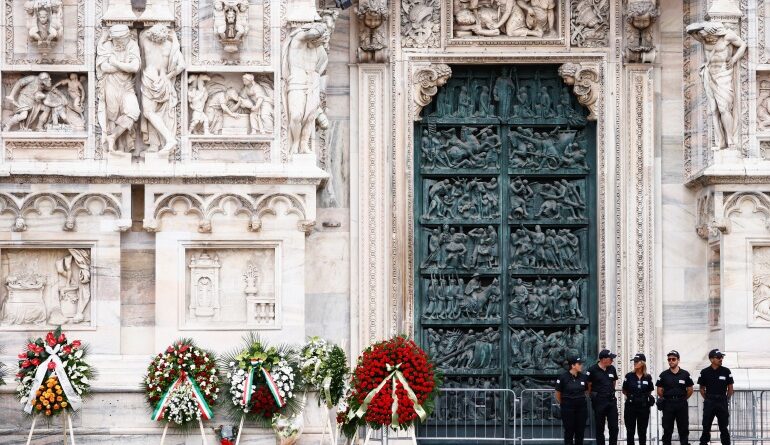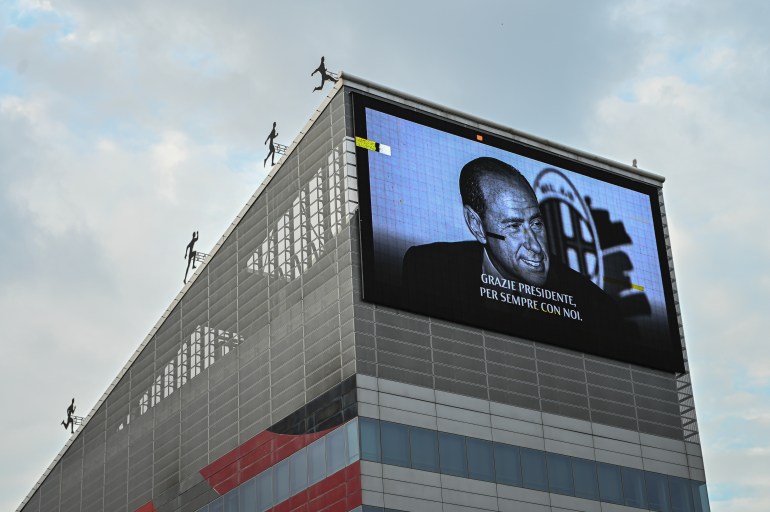
Milan, Italy – It is an official day of national mourning in Italy with flags at half-mast to mark the death of Silvio Berlusconi, the country’s most divisive and charismatic public figure who dominated politics, business and sport for decades.
Tens of thousands of supporters of the controversial four-time prime minister are expected to gather for a state funeral in Milan on Wednesday to pay their respects to the so-called “knight”, a man who embodied the modern era of self-made tycoons. and remained beloved by many Italians despite a history of legal troubles, sex scandals and international gaffes.
Berlusconi died on Monday at the age of 86 at the San Raffaele hospital in Milan. He had been admitted there on Friday for previously planned tests related to a chronic form of leukemia.
His death came as a shock to many. Despite his frail health, Berlusconi’s defining presence on the Italian political scene, coupled with his exuberance and perpetual ultra-tanned gaze, had almost created the illusion that he would have lived forever, as the host of television Bruno Vespa Tuesday night.
“It has left a huge void,” said Rosanna de Angelis, owner of a 60-year-old store in central Milan. “He made everyone feel important, he was human,” she added.
“We will all miss him, even those who criticized him, and even the cartoonists who will now have nothing to draw,” said Tiziana Guerra, who sells flowers near the Gothic Duomo cathedral, a work master of 14th century architecture where Berlusconi’s funeral took place. will be held.
The church will host around 2,000 people, including Italian President Sergio Mattarella and European Union Commissioner Paolo Gentiloni. It is not yet clear which world leaders will attend the event, but state news agency ANSA reported that Qatari Emir Sheikh Tamim bin Hamad Al Thani and Hungarian Prime Minister Viktor Orban will be present. The funeral will begin at 15:00 local time (13:00 GMT) and will be shown live on large screens installed in the city’s main square.
Meanwhile, as newspapers and broadcasters raved about ‘The End of an Era’, fans flocked to Villa Arcore, Berlusconi’s lavish mansion outside Milan, where a small private soiree took place on Tuesday which was attended by relatives and close friends. Political flags, bouquets of flowers and a large banner reading “Thank You Forever President” surround the area outside the house.
Security personnel stand near wreaths for the funeral of former Italian Prime Minister Silvio Berlusconi in front of the Duomo cathedral in Milan, Italy [Yara Nardi/Reuters]
‘Entering the field’
Berlusconi broke into Italian politics in 1994 with an eight-minute video announcing the founding of a new right-wing party, Forza Italia (Go Italy). His goal was to build a new political movement on the ashes of the post-1945 First Republic that had been decimated by a wave of corruption scandals that had left Italians distrustful of the political elite.
Already a successful businessman, media mogul and owner of the successful AC Milan football team, Berlusconi tried to win the hearts of Italians by using a radically different language, which was direct, modern and populist. He broke with a decades-old tradition of wanting politicians to play a role in educating the electorate and used his charm to connect directly with people. In the process, he reoriented politics away from the ideological background of traditional parties and towards a cultural one.
“He was a charmer, a leader who used his personal charisma rather than offering political content,” said Edoardo Novelli, a sociologist and professor of political communication at the University of Rome Tres.
His most powerful weapon was Mediaset, a popular cable television network that broke the news monopoly held by the state media until then. It brought US soap operas and shows starring female entertainers into the homes of Italians, accelerating a cultural shift that had already begun in the 1980s.
“Berlusconi was an empathetic man by nature and he had a pulse of what Italians wanted through his commercial television,” said Lorenzo Castellani, a history professor at Rome’s LUISS University who focuses on right-wing parties. italian “His main ability was to understand what most Italians cared about and most of the time it was about jobs, wealth, entertainment… And not great ideals or political ideologies,” he added.
And it worked. In 1994 he was elected prime minister for the first time, a position he would regain in 2001, 2005 and 2008.
A testament to his resilience and appeal, Berlusconi at the time of his death was still the leader of Forza Italia and a small but key coalition partner in Prime Minister Giorgia Meloni’s government.
 A photo shows a giant screen depicting the late Italian businessman and former prime minister Silvio Berlusconi and reading “Thank you president, forever with us” outside the headquarters of AC Milan football club in Milan. [Piero Cruciatti/AFP]
A photo shows a giant screen depicting the late Italian businessman and former prime minister Silvio Berlusconi and reading “Thank you president, forever with us” outside the headquarters of AC Milan football club in Milan. [Piero Cruciatti/AFP]
Loved and hated
Berlusconi’s playful touch was loved by some, but loathed by others. Never far from controversy, he faced accusations of corruption and pushing laws to protect his interests.
His humor often backfired, especially among international guests. In 2008, he was criticized for referring to then US President Barack Obama as a “tan man”. The following year, he was scolded by Britain’s Queen Elizabeth at a G20 summit for speaking too loudly in public.
In 2013, two years after leaving office, Berlusconi was convicted of tax fraud and later of political corruption. He narrowly avoided jail, but the conviction banned him from office until 2019. He was also investigated for the infamous “Bunga Bunga” sex parties involving young women and minors.
Berlusconi’s critics saw him as someone who entered politics to protect his business interests and failed to achieve sound economic reforms as promised during election campaigns.
“There were only partial results in terms of tax cuts, but nothing very structural,” Castellani said, adding that the tycoon was also hampered by his ego, which prevented him from naming a successor and creating a ruling class that could survive him.
“He also spent years defending himself in trials, to defend the interests of his media empire while sacrificing reforms to defend himself, his political consensus and personal interests,” added Castellani.
A divisive figure in life, Berlusconi also managed to spark controversy after his death. The government’s announcement of a day of national mourning, an honor not accorded to any other former prime minister, was met with some criticism.
“We must not forget that some of his actions were disrespectful to the state he represented,” said Senator Andrea Crisanti, who strongly opposed national honors.
Rosy Bindi, former head of the Anti-Mafia Commission, said it was “inappropriate” for “a person as divisive as Berlusconi” and the Repubblica newspaper said the “institutional closure” was “extreme”.
[ad_2]
Source link





